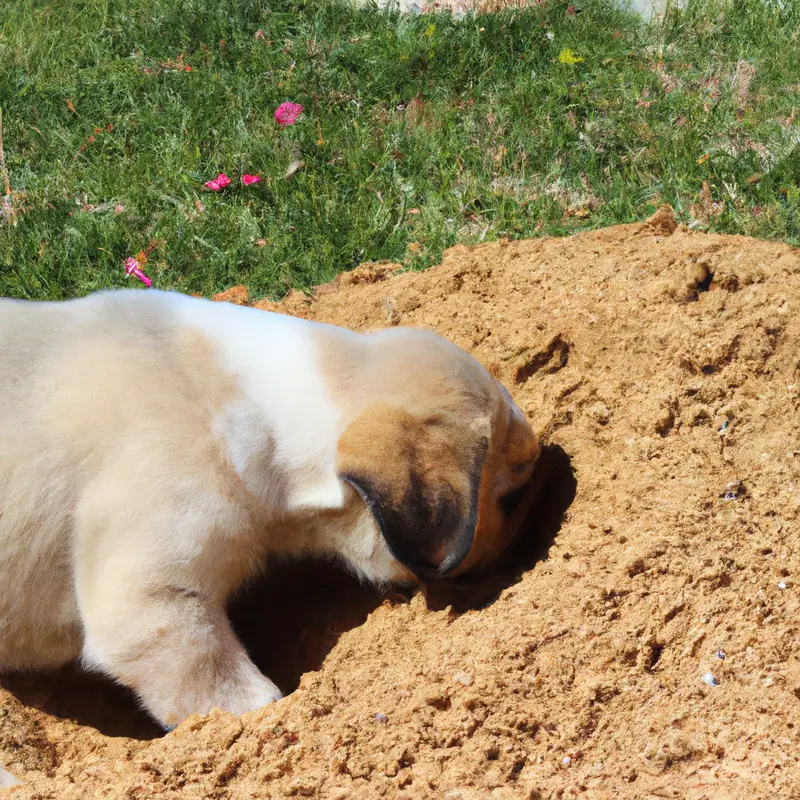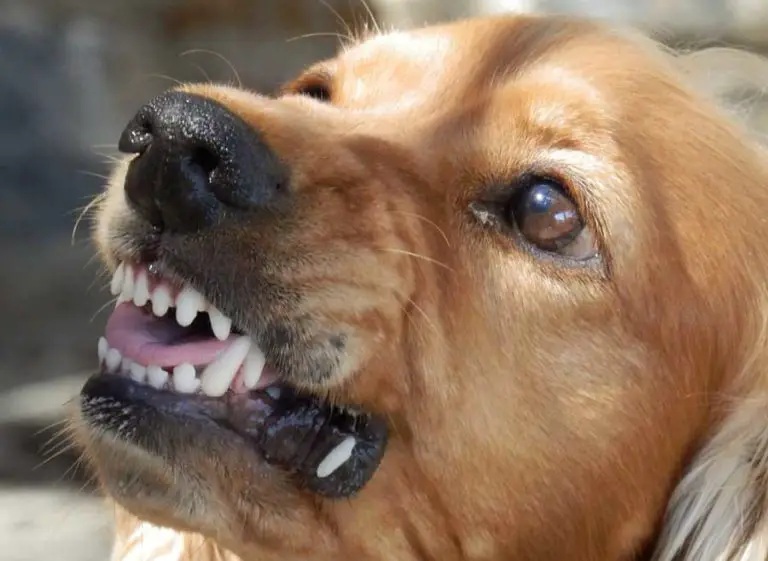Why Is My Puppy Digging – Training Tips
Key Takeaways:
- Puppies often dig because of innate instincts and natural behavior.
- Boredom, lack of exercise, or attention seeking can lead to excessive digging in puppies.
- Providing mental stimulation, regular exercise, and designated digging areas can help curb destructive digging.
- Consistent training and positive reinforcement are essential to redirect your puppy’s digging behavior.
Have you ever come home to find your precious garden transformed into a puppy excavation site?
It can be frustrating, to say the least.
But have you ever wondered why your adorable little furball is so fixated on digging up your backyard?
In this article, we’ll dive deep into the behavior of puppies digging and explore the reasons behind it.
We’ll also uncover whether it’s a normal phase or a cause for concern.
Plus, we’ll share some practical tips to manage and redirect this behavior effectively.
So, grab a cup of coffee, make yourself comfortable, and let’s dig into the world of puppy digging together!
| Reasons | Solutions |
| Puppies may dig to entertain themselves or alleviate boredom. | – Provide plenty of toys and interactive activities to keep your puppy mentally and physically stimulated. – Spend quality time playing with your puppy and providing attention. – Engage in training sessions to provide mental stimulation and tiredness. – Consider enrolling your puppy in puppy socialization or obedience classes to provide additional mental and social stimulation. |
| Puppies may dig to escape or explore the environment. | – Ensure your puppy has a safe and secure area to play and explore. – Supervise your puppy while outside to prevent escape attempts. – Block off or fence areas where digging is not permitted. – Provide boundaries and reinforce them with positive reinforcement training. – Redirect your puppy’s attention to appropriate activities or toys when they start digging inappropriately. |
| Puppies may dig to bury or retrieve items. | – Provide appropriate toys and play objects for your puppy to dig and bury. – Teach your puppy the “leave it” and “drop it” commands to prevent the burying or retrieving of inappropriate items. – Offer positive reinforcement for appropriate digging behavior. |
| Puppies may dig because of instinctual behaviors or breed tendencies. | – Research your puppy’s breed and learn about typical tendencies or behaviors. – Provide outlets for instinctual behaviors, such as digging pits or designated digging areas in your yard. – Consider consulting with a professional dog trainer or behaviorist for breed-specific guidance or training techniques. |
| Puppies may dig due to anxiety, stress, or separation anxiety. | – Provide a calm and safe environment for your puppy. – Gradually expose your puppy to new environments and experiences to reduce anxiety. – Implement positive reinforcement training and reward desired behaviors. – Consider seeking guidance from a professional dog trainer or veterinarian for treating anxiety or separation anxiety. |
Understanding the Behavior of Digging in Puppies
Puppies dig for various reasons, and understanding this behavior is key to addressing it effectively.
Why Do Puppies Dig?
Puppies dig for several reasons.
- Exploration: Digging allows them to investigate their surroundings and satisfy their curiosity.
- Boredom: If they don’t have enough mental and physical stimulation, they may resort to digging as a form of entertainment.
- Escape: Some puppies dig under fences or barriers to try to escape, especially if they are feeling anxious or want to explore beyond their designated area.
- Comfort: Digging can provide puppies with a cool spot to rest in hot weather or create a cozy den-like space.
- Instinctual behavior: Certain breeds have a natural instinct to dig, as it historically helped them hunt prey or build shelters.
- Storage: Puppies may dig to hide and store their toys or treats for future enjoyment.
Understanding the reasons behind your puppy’s digging behavior can help you address it effectively and provide alternative outlets for their natural instincts.
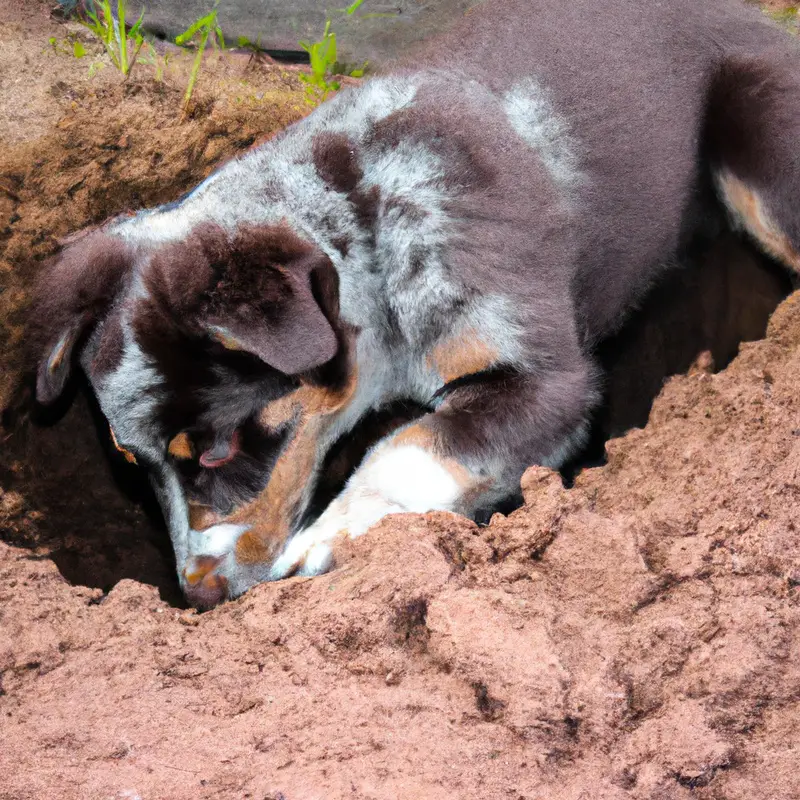
Is Digging Normal for Puppies?
Yes, digging is normal behavior for puppies.
It is a natural instinct for them, and there are several reasons why they do it.
Here are a few possible reasons:
- Exploring and investigating their surroundings
- Trying to bury or hide toys or bones for later
- Seeking comfort or creating a cozy den
- Releasing excess energy or boredom
- Marking territory or seeking attention
To prevent excessive digging, provide mental and physical stimulation, redirect their behavior, and create designated digging areas with appropriate toys and treats.
Remember that patience and consistency are key in teaching them where and when it is appropriate to dig.
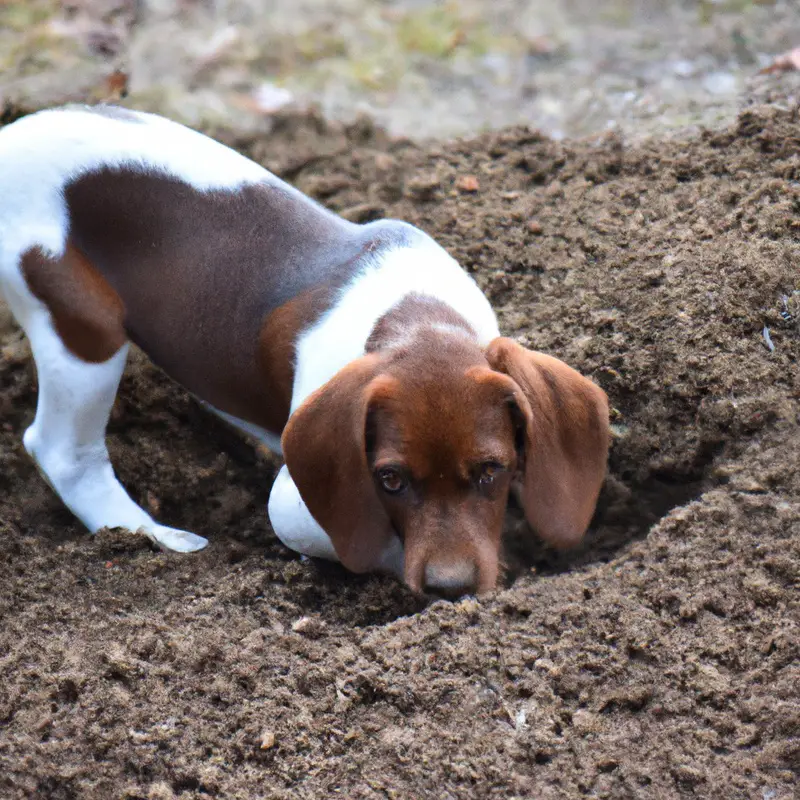
Common Reasons Why Puppies Dig
There are several common reasons why puppies dig.
One reason is that they are bored and digging provides them with mental stimulation.
Another reason is that they are trying to escape from their yard or enclosure.
Puppies may also dig because they are seeking comfort or a cool spot to lie down.
Finally, some puppies may dig because they are instinctively searching for prey or to bury items.
These are just a few of the common reasons why puppies dig.
The Negative Consequences of Digging Behavior
Digging behavior can have negative consequences for both your puppy and your property.
Potential Damage Caused by a Digging Puppy.
Potential Damage Caused by a Digging Puppy
A digging puppy can cause several potential damages around your home and yard. Here are some of the most common issues:
- Ruined landscaping: Puppies can dig up flower beds, gardens, and lawns, destroying plants and creating unsightly holes.
- Damaged structures: If your puppy digs near the foundation of your house or other structures, they can weaken the stability and potentially cause costly repairs.
- Uncovering hazards: Digging can sometimes unearth dangerous objects like sharp rocks, broken glass, or buried wires, posing a risk to your pup and others.
- Escape routes: If your puppy manages to dig under fences or gates, it can lead to escapes and potential dangers, such as traffic accidents or encounters with aggressive animals.
- Chewing on dug-up items: Puppies often dig to hide and retrieve objects. If they dig up shoes, garden tools, or other items, they may chew on them, causing damage and potential health risks.
It’s important to address and redirect your puppy’s digging behavior to prevent these damages and keep both your furry friend and your property safe.
Health Risks of Digging in Certain Environments
Digging in certain environments can pose health risks for your puppy. Here are some dangers to be aware of:
- Contaminated soil: In areas where pesticides, fertilizers, or other chemicals have been used, digging exposes your puppy to harmful substances.
- Parasites: Digging in areas where wild animals have been can expose your puppy to parasites like fleas, ticks, and worms.
- Sharp objects: Digging in places with debris or sharp objects can lead to cuts, punctures, or other injuries for your puppy.
- Toxic plants: Some plants can be toxic if ingested. Digging in areas with these plants increases the risk of ingestion.
To protect your puppy, supervise their digging, provide a designated digging area, and ensure they have regular check-ups with a veterinarian.
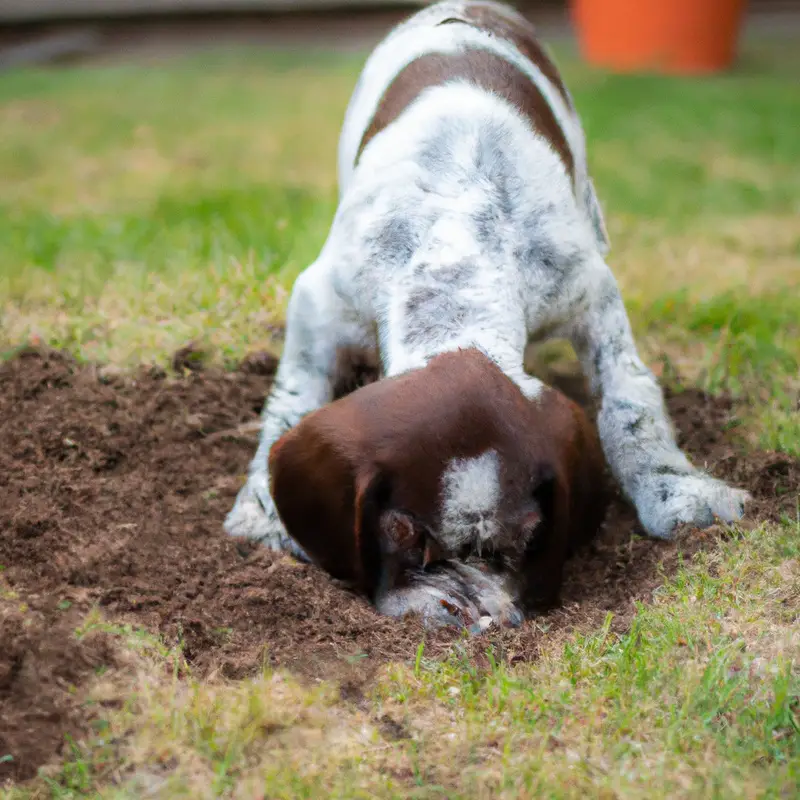
Managing and Redirecting Digging Behavior in Puppies
To manage and redirect your puppy’s digging behavior, focus on providing sufficient exercise and mental stimulation, creating a suitable digging area, and using positive reinforcement to dissuade digging.
Providing Sufficient Exercise and Mental Stimulation
To address your puppy’s digging behavior, it is important to provide them with sufficient exercise and mental stimulation. This helps them release excess energy and keeps their minds engaged.
A tired and stimulated puppy is less likely to resort to digging as a form of entertainment.
Daily walks, playtime, and interactive toys can be great ways to achieve this. Additionally, mental stimulation activities like puzzle toys and training sessions can keep their minds active and prevent boredom.
Remember to tailor the exercise and mental stimulation to your puppy’s age, breed, and energy levels.
Creating a Suitable Digging Area
If you want to manage your puppy’s digging behavior, creating a suitable digging area is a great solution. Here’s what you can do:
- Find a designated spot in your yard where your puppy can dig freely without causing any damage.
- Prepare the area by loosening the soil and adding sand or soft dirt to make it appealing for digging.
- Bury some toys or treats in the area to encourage your puppy to dig there instead of your garden.
- Regularly supervise your puppy while they are in the digging area to redirect their digging behavior if needed.
- If your puppy starts digging in an inappropriate area, gently guide them towards the designated digging area.
By creating a suitable digging area, you provide your puppy with an outlet for their natural digging instincts, while also protecting your garden and yard.
Using Positive Reinforcement to Dissuade Digging
Using positive reinforcement is an effective way to discourage digging in puppies.
Instead of punishing your puppy for digging, focus on rewarding and praising them for appropriate behavior.
When you catch your puppy in the act of digging, redirect their attention to a more appropriate activity such as playing with a toy or engaging in a training session.
Provide them with plenty of mental and physical stimulation to prevent boredom, and make sure they have access to a designated digging area where they can satisfy their natural instincts.
By consistently reinforcing positive behavior, you can help discourage digging habits in your puppy.
When to Seek Professional Help for Digging Behavior
If your puppy’s digging behavior becomes a persistent problem despite your efforts to address it, it may be time to consult a professional dog trainer for help.
Signs that Your Puppy’s Digging Behavior is a Problem
Signs that Your Puppy’s Digging Behavior is a Problem:
- Excessive digging: If your puppy is digging excessively and persistently, it may be a sign of an underlying issue. Normal digging behavior includes burying bones or toys. But if they dig up your garden or destroy your yard, it could be a problem.
- Escaping: If your puppy uses digging as a means to escape from your yard or fenced area, it can be dangerous. This behavior puts them at risk of getting hit by a car or getting lost. It’s important to address this issue promptly.
- Obsessive digging in confined spaces: If your puppy constantly digs in confined spaces like their crate or a specific corner of the house, it may indicate anxiety or frustration. They could be trying to release pent-up energy or alleviate stress.
- Ignoring redirection: If you try to redirect your puppy’s digging behavior but they continue to persistently dig in inappropriate areas, it may be a sign that professional help is needed. A professional dog trainer or behaviorist can provide guidance and support to address the problem effectively.
- Reckless digging causing harm: If your puppy’s digging behavior is causing harm to themselves or others, such as ingesting harmful objects while digging or causing damage to your property, it’s crucial to seek professional help. They can help identify the root cause and develop a tailored plan to modify this behavior.
Remember, understanding these signs and seeking help early on can prevent the behavior from escalating and ensure a happy and safe environment for both you and your puppy.
What Can a Professional Dog Trainer Do to Help?
A professional dog trainer can help with your puppy’s digging behavior by:
- Assessing the underlying reasons: They will examine your puppy’s behavior, environment, and any potential triggers to identify the root cause of the digging behavior.
- Designing a customized training plan: Based on their assessment, the trainer will create a tailored training program to address your puppy’s specific needs, which may include redirection techniques, positive reinforcement, or environmental modifications.
- Teaching appropriate alternatives: The trainer will teach your puppy alternative behaviors to replace digging, such as fetch, puzzle toys, or interactive games, to redirect their energy and satisfy their natural instincts.
- Providing guidance and support: Throughout the training process, a professional trainer will guide you on how to effectively implement the training techniques, offer advice on consistency, and provide ongoing support to ensure success.
- Modifying training methods if needed: If one approach doesn’t work, a professional trainer will be able to adapt and modify the training methods to find what works best for your puppy’s individual needs.
Remember, every dog is unique, and a professional trainer can offer expertise, guidance, and tailored solutions to address your puppy’s digging behavior effectively.
Frequently Asked Questions about Puppy Digging
Can Digging Be a Sign of Boredom in Puppies?
Yes, digging can be a sign of boredom in puppies.
Puppies, just like humans, need mental stimulation and physical exercise to stay happy and healthy.
If they don’t get enough of these, they may resort to destructive behaviors like digging.
If you notice your puppy digging excessively, it could be a sign that they are not getting enough mental and physical stimulation.
Engaging them in interactive play, providing puzzle toys, and regular exercise can help alleviate boredom and reduce digging behavior.
How Long Does It Take to Correct Digging Behavior in a Puppy?
Correcting digging behavior in a puppy can take time and patience. The length of time it takes to correct this behavior can vary depending on the puppy and the consistency of your training efforts.
It’s important to provide alternative outlets for your puppy’s energy and curiosity, such as interactive toys and regular exercise.
With consistent training and redirection, you can expect to see improvements over time. Remember to reward positive behaviors and avoid punishing or scolding your puppy, as this can create confusion and anxiety.
Can Neutering/Spaying Help Reduce Digging?
Neutering or spaying your puppy can help reduce digging behavior.
When a puppy is neutered or spayed, it can help decrease their hormonal drive, including the urge to mark territory and explore the surrounding.
This may make them less inclined to dig.
However, it’s important to note that neutering or spaying alone may not completely stop digging.
It’s also crucial to provide proper exercise, mental stimulation, and training to redirect their energy into more appropriate activities.
Final Verdict
It is important to understand that digging is a natural behavior for puppies, but it can become problematic if it leads to damage or poses health risks.
By addressing the root causes of digging and providing appropriate outlets for their energy and curiosity, we can effectively manage and redirect this behavior.
Offering mental stimulation, creating a designated digging area, and using positive reinforcement are all effective strategies.
However, if digging becomes excessive or uncontrollable, seeking the assistance of a professional dog trainer is recommended.
Remember, with patience and consistency, you can help your puppy overcome their digging tendencies and promote a positive and well-behaved companion.

